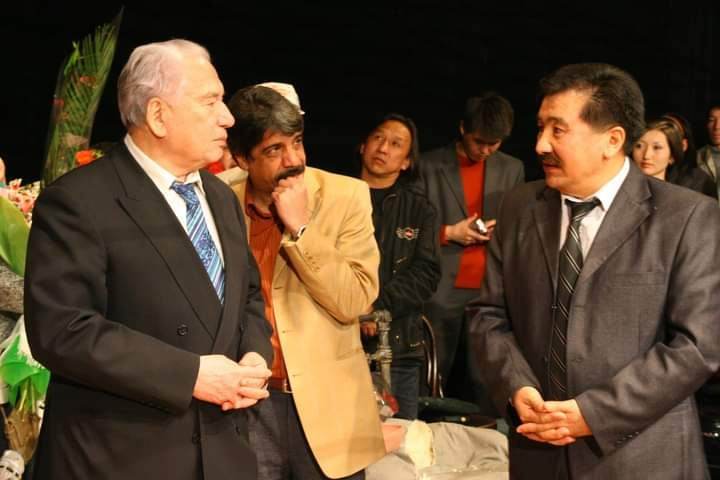Barzu Abdurazzakov (1959) is a famous Tajik playwright and theater director. Made an Honored Artist of the Republic of Tajikistan in 2001, he has since 2009 lost favor with the authorities.
Abdurazzakov comes from a long line of actors: his mother, Fotima Gulyamova (12/31/1934-03/01/2021), was an actress and his father, Khabibullo Abdurazzakov (11/07/1937-01/19/2021), an actor and director. The young Barzu thus absorbed the spirit of the theater from childhood by attending his parents’ rehearsals. However, Barzu himself, who holds diplomas from the Mirzo Tursunzade Tajik State Institute of Arts (1980) and the directing department of the Russian State Institute of Theater Arts (GITIS, 1987), says that he came to the theater to destroy it.
In front of me is a handsome, if not tall, middle-aged man with dark, deep-set eyes and a soft voice who constantly repeats my name, Lola. “You know, Lola; you understand, Lola; well, you yourself know this, Lola.” This is a characteristic feature of Barzu’s conservation with an interlocutor; he always looks directly into the eyes as if seeking the depths of the soul, which makes one weigh every word during a conversation.


Barzu Abdurazzakov gained widespread popularity in the country with his production of the play “Madness. Year 93,” based on the Peter Weiss play. This performance was in 2009 banned by the collegium of the Ministry of Culture of Tajikistan, which saw in the events of the eighteenth-century French Revolution echoes of the Tajik civil war of 1992-1997. Later, the author of the production would tell a journalist:
… it was my civic duty to tell how I feel about the present and future of my country—this play has been and will remain responsive and relevant in all countries of the world, wherever it is shown. We do not call anyone to the barricades; Tajikistan has seen enough blood. We do not emphasize the political aspect, but rather the personal aspects. Either you are a human being, a citizen of your country, or you are an eternal slave.
For him, the core of this story was freedom of expression. Since then, the director has been an “unreliable and suspicious person” who has not been invited to theaters in Tajikistan, where almost all art institutions are funded by the state and their repertoires strictly controlled. Thus, Barzu Abdurazzakov has become one of the country’s main creative dissidents.


I’m talking to Barzu on WhatsApp messenger and I hear the same lovely voice, but the way he talks about the horror that has been happening in Ukraine since the invasion of Russian troops saddens. I ask him about the exodus of Russian citizens to Central Asia and the Caucasus following the announcement of military mobilization. And he says:
This is a disaster. Seeing what my once-beloved country (Russia) is turning into is terrible. I have been observing this for a long time. Starting in 2014 in particular, I already began to understand that it had all led to a catastrophe; the “plague” was approaching this country. I predicted that conflict with Ukraine would be inevitable. And now, after the mobilization kicked off and Russians began to flee, lining up in kilometer-long queues on the border with Kazakhstan, Georgia, etc., filling hotels in Tajikistan, of course I sympathize with the Russians. But on the other hand, I don’t like it. The Russians should have dealt with their powerholders, not run. If I had my way, I would close my borders. I would certainly let women with children, pregnant women, the disabled pass through, but I would not allow in the men who are running away. Why do I say this? Because they would soon remember that we were all different from them and foment an upsurge of nationalist sentiments both in the Central Asian countries and in the Caucasus. Russian imperial thinking has not disappeared anywhere.
Few people in Tajikistan spoke openly against the Russian invasion of Ukraine. Barzu Abdurazzakov is one of those individuals who did not support the aggression of the Russian Federation in Ukraine and who has reflected on political issues and post-colonial relations in the post-Soviet space.
I ask him how he sees the rise of nationalism in our country. Does it not seem to him that the measures the authorities have taken to limit the development of radicalism have been justified? He answers, with a deep sigh, that he has always been afraid of the rise of nationalism, which leads to radicalism. He says that he “can understand ‘nationalist’ maxims in Europe because their cultural code allows them to speak about it without converting to fascism or Nazism. The Europeans have already learned this lesson and therefore they talk calmly about their nationalist views. But when our people (Tajiks) start talking about their nationalist ideas, they turn into insults”.

“In Tajikistan, the intelligentsia has been almost entirely destroyed. Serious journalists have left the country, persecution of activists has continued, and therefore, what can be said about the way to express their views? I am afraid that scoundrels, unscrupulous people, deal with issues of nationalism. After all, look, when there were clashes on the Tajik-Kyrgyz border, I read only insults about the appearance of Kyrgyz. They just said how narrow-eyed they were, and so on. I don’t like it at all when Tajiks focus on the external differences between people. I realize that we have a conflict, but it must be resolved by political means. We must solve problems not as ‘Aryans with narrow eyes,’ but as civilized people. When I hear racist exclamations, I always answer them: “Who are you to humiliate people?” In order to save the country, it is necessary for the intelligentsia to return to the country, to save it, so that we can work together to strengthen our nation. We must all return to the country and contribute to the development of our state. We cannot leave it when it has been seriously ill,” concludes Barzu Abdurazzakov bitterly.
I continue the conversation with the director by asking about the meaning of Tajik theater. He forcefully retorts that he does not understand the term “Tajik theater.” He does not think that the identity of the theater equates with the language of the locality. “When I make performances about my country, talk about the problems of my country, then it can be called Tajik theater. Furthermore, when I reflect on the way of thinking of people in my country, their habits, traditions, peculiarities of their way of life, then it can be identified as Tajik theater. However, even then, for me, the priority is human beings, regardless of their ethnic origin, nationality, etc., and therefore, I do not see many differences between Tajik theater and other theaters.”


I listen to Barzu, his tone imbued with all the bitterness of what was said and implied, and continue to ask questions about Tajik theater, a subject that is close to my heart. I love theaters very much. I remember when I first arrived from the provinces, where there was not a single theater, just cinemas for projecting films and houses of culture for youth. I went to the theater on my own to see a play at the Vladimir Mayakovsky Russian Drama Theater based on Mikhail Bulgakov’s novel Master and Margarita. I was glued to the stage, recalling quotations from the novel that I had learnt by heart in my childhood. For me, the performance was a wonderful experience, the pinnacle of theater arts. It took place before the start of the civil war (1992-1997). Later, in the 2000s, when Tajikistan came back to life, I sometimes went to the theater, and then I met Barzu Abdurazzakov and the rest of the theater community, including the legendary figure of Tajik theater Farrukh Kasymov, the founder of the poetic side of the Tajik theaters, who had already been stricken by a disease of the nervous system and was confined to a wheelchair. I understand very well Barzu’s pain and sadness about the impossibility of—or at least limited opportunity for—reflection on reality through theater arts, which have become a form of heroism in authoritarian regimes. I share his grief.
Breaking the ice, I ask him about the destiny of a production about Tajik migrants that has never been shown in Tajikistan. He explains that the performance, “Muhochiron” (Emigrants), was staged by Barzu based on the play by Slawomir Mrozhek of Poland. It is a story about two emigrants, with two different destinies, who meet in the same space. One is an intellectual—a Vaclav Havel figure. “The other is the anti-hero, whom I hate endlessly,” says Barzu. “I wanted to look into the souls of two Tajiks, absolutely opposed to each other. One whom I hate and the other whom I respect, thanks to whom I live and have hope for the revival of my country.” Barzu deeply appreciates people’s intelligence and believes that with the civil war (1992-1997) and the current state of the ruling regime, the stratum of the Tajik intelligentsia has become thinner—and may soon even disappear. In his production, he exposes popular greed and lack of spirituality through the image of the anti-hero, blaming the decline in the country’s level of morality on illiterate, unprincipled people, deceitful lumpenproletarians, self-satisfied people who have no doubts about anything. “I wanted to show two different poles or edges of human nature, different sides of my people,” concludes Barzu.
We are a little silent, as if we are watching together the screen, where crowds of Tajik migrants in distinctive orange travel jackets pass before our eyes, each preoccupied with their own thoughts. I break the silence and ask Barzu about the production he wanted to do with the “Nigohi Nav” group of theater activists in 2022 in Dushanbe (soon thereafter, one of the founders of the group was convicted by the authorities).
Barzu tells me that after being out of the country for 12 years, he wanted to celebrate his return by staging a new production. He returned to Dushanbe in March 2022 and started working with a group of enthusiasts—Daler Imomali, Soro Sobir, and Shahjamshed Umari—on the topic of mankurtism. Barzu considers the loss of memory to be the most dangerous disease afflicting our society this century. “Especially what has happened to post-Soviet people: it’s not just memory loss, it’s a loss of personality, human dignity, absolute slavery,” says Barzu. “It’s for the same reasons that we forgot about the hundreds of coffins of our fellow citizens who died in migration. For example, today I read one of their chats on social media where a doctor had written: ‘Finally, we are removing these Afghans from the country, today we are sending 500 people, and tomorrow we will send more back to Afghanistan.’ I am horrified by the comments of people who agree with the opinion of that doctor. None has recalled that the Afghans were once considered our brothers; they were related to the Tajiks. After all, Afghan refugees are the same as Tajiks: poor and powerless. However, at the same time, the chat cheerfully discussed the arrival of the Russians, which they seemingly liked. I consider it to be mankurtism of the purest kind. Moreover, I think this is where the root of slavery begins.”

Thus, in their new production, Barzu and his colleagues explored the phenomenon of slavery. They worked on the performance meticulously for two months. They penetrated “with a scalpel” the fabric of Aitmatov’s work “Snowstorm Station” (or “And the Day Lasts Longer than a Century”), studying the subtext, hints, everything that he could not finish due to censorship—it was all returned. “Consequently, we penetrated the brains of human beings who have forgotten their own roots, who have lost their own memories. Of course, our performance did not take place in the steppes of Kazakhstan, but here in Tajikistan. We used Tajik images and our reality. This is the story of a family in which a son does not speak his native language at all; therefore, the main character does not understand what his mother is talking about,” explains Barzu. When the performance was ready, outside colleagues gathered to discuss the performance. One critic exclaimed in admiration that the performance was one of the best in post-independence Tajikistan. Unfortunately, however, the performance was banned on the pretext that “the production is harmful for both the domestic and foreign policy of Tajikistan.”
As we end our conversation, I ask him again: “Where are you now?” “In Tashkent,” the director replies. “I am making a production based on the play ‘Biedermann and the Arsonists’ by the Swiss playwright Max Frisch.”
I wish him good luck with his productions and his future. Suddenly, a quote comes to mind from an article by a well-known local online media outlet that, on the occasion of Abdurazzakov’s 60th birthday, republished his statements. I consider it as a final touch to this essay:
“Perhaps my mission is to be a Tajik pilgrim, to travel around the cities and talk about Tajikistan through performances. It is a way I serve my country. After all, there were missionaries who traveled from Spain to Latin America to spread the word of God. So, too, do I bring the spirit of my culture to other nations. When the theater posters are being prepared, the only thing I ask is that “Barzu Abdurazzakov (Tajikistan)” be written there. That’s enough for me…”














